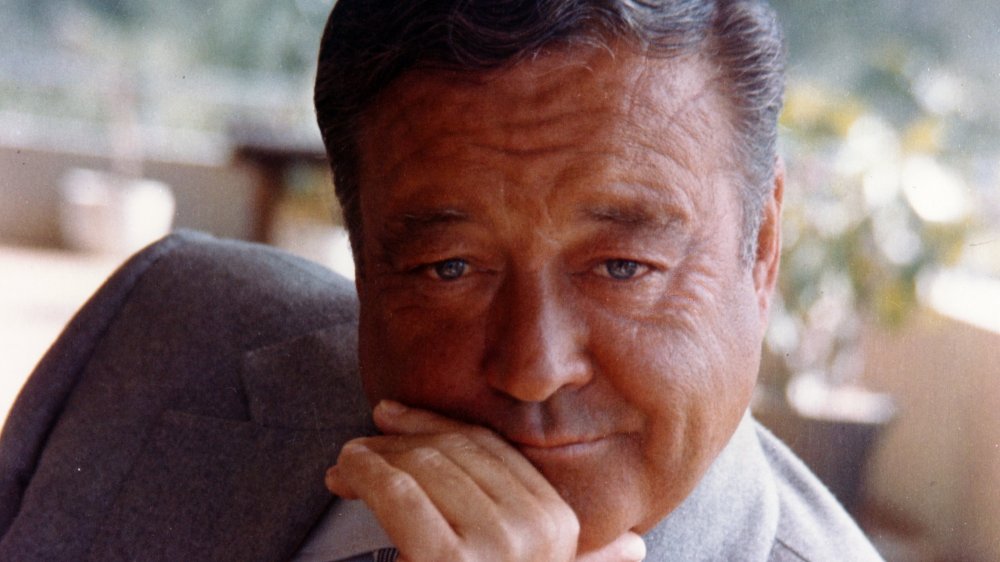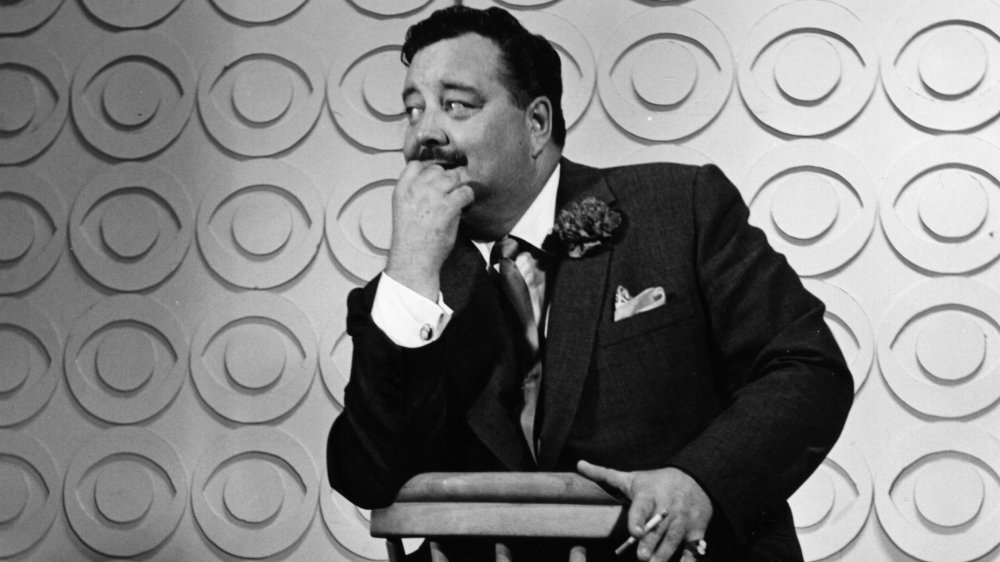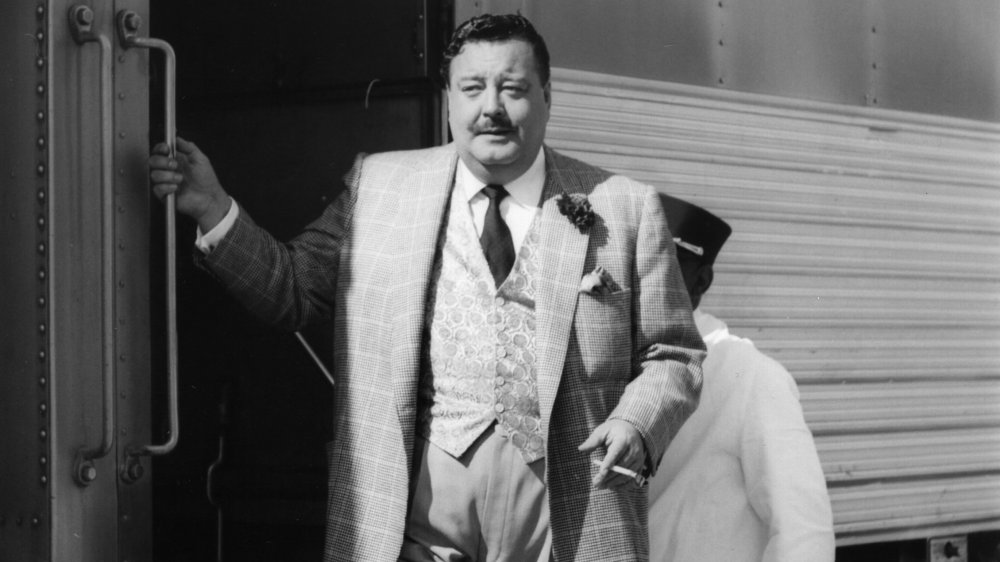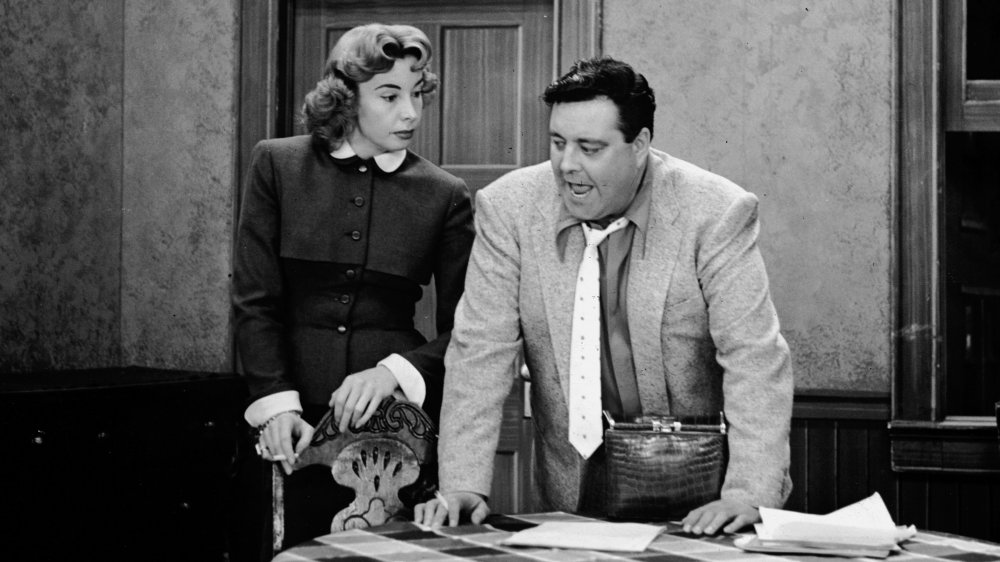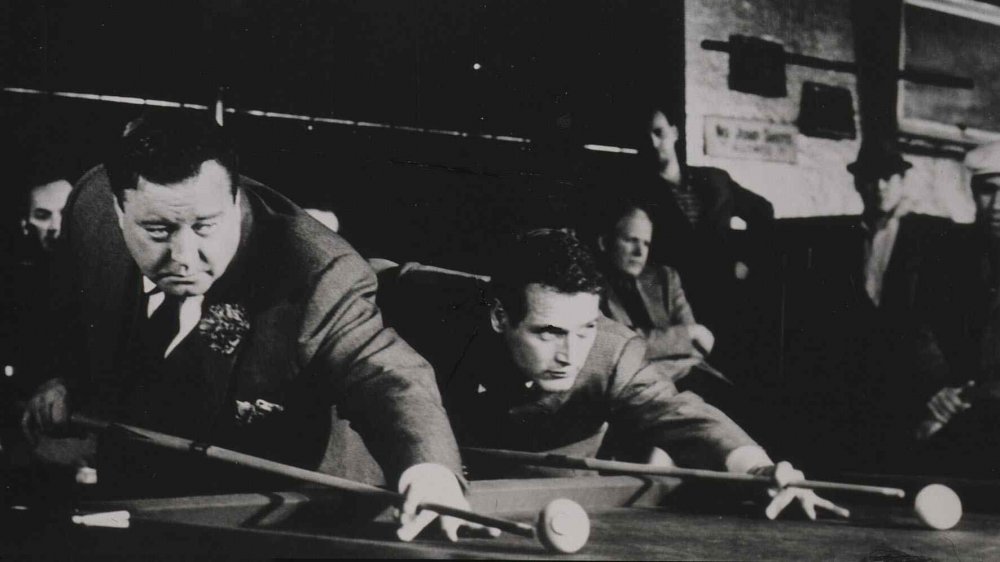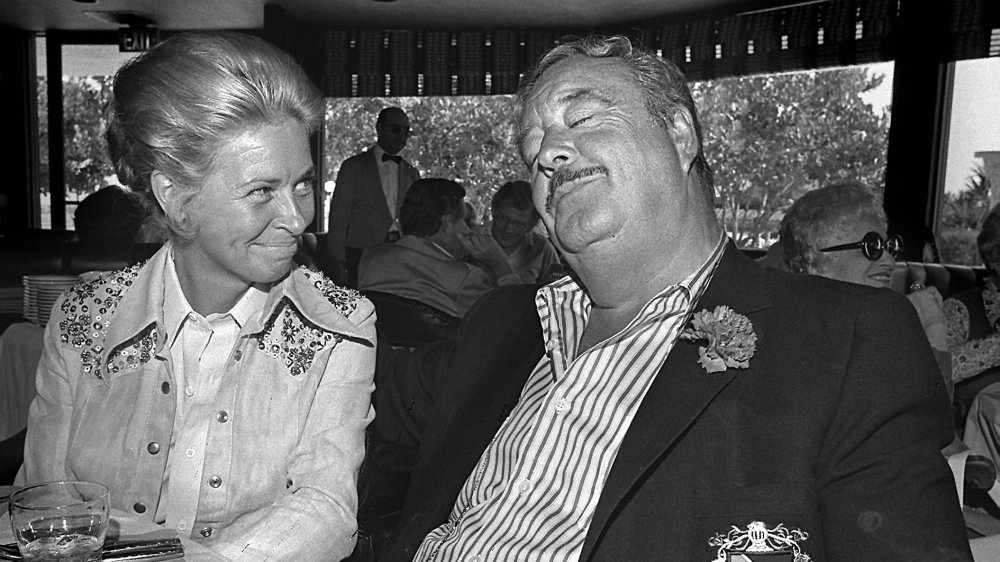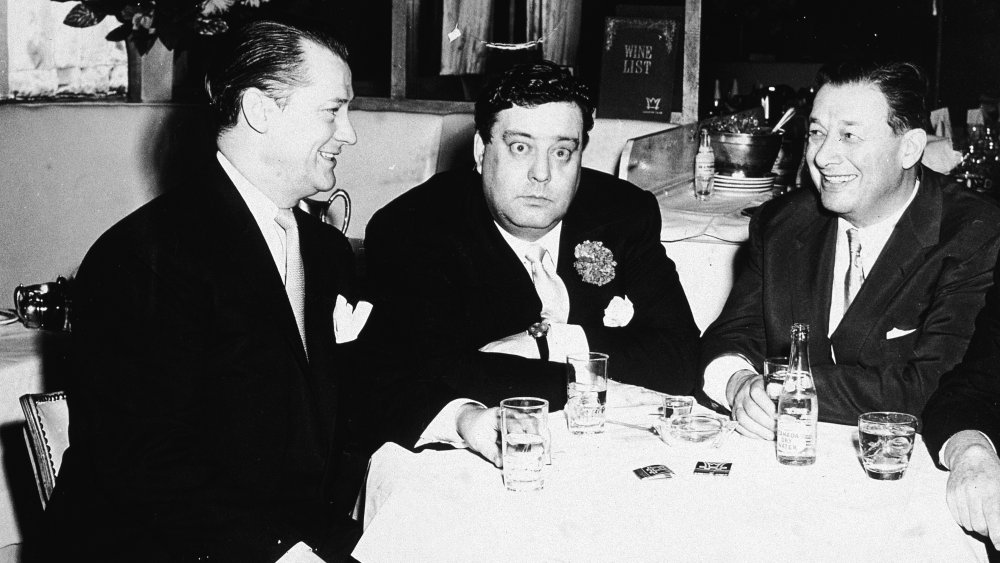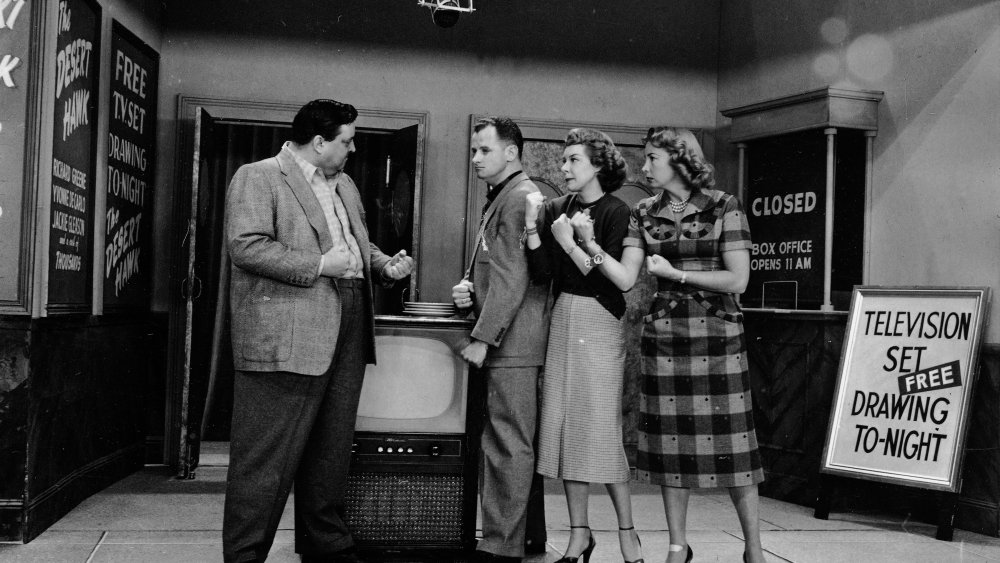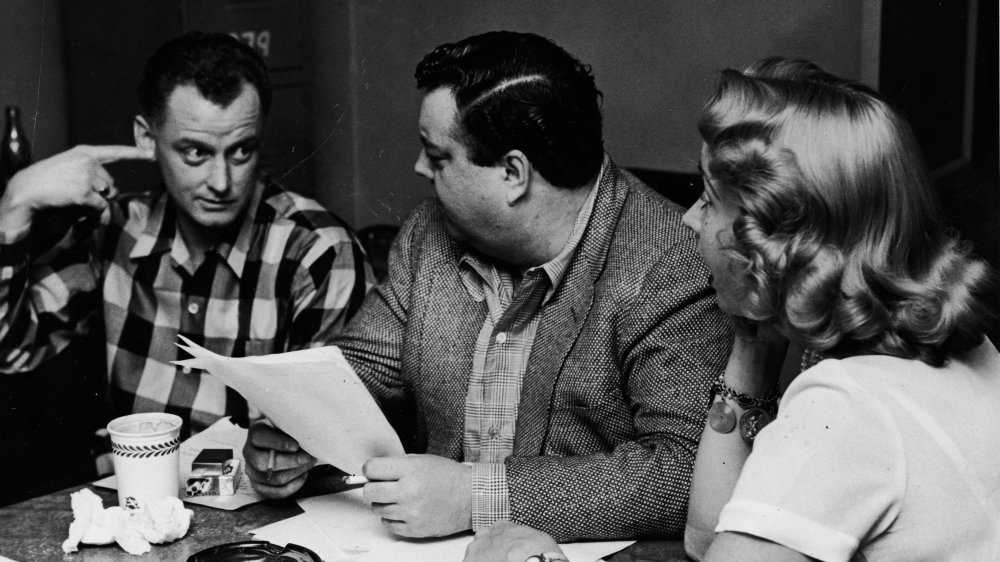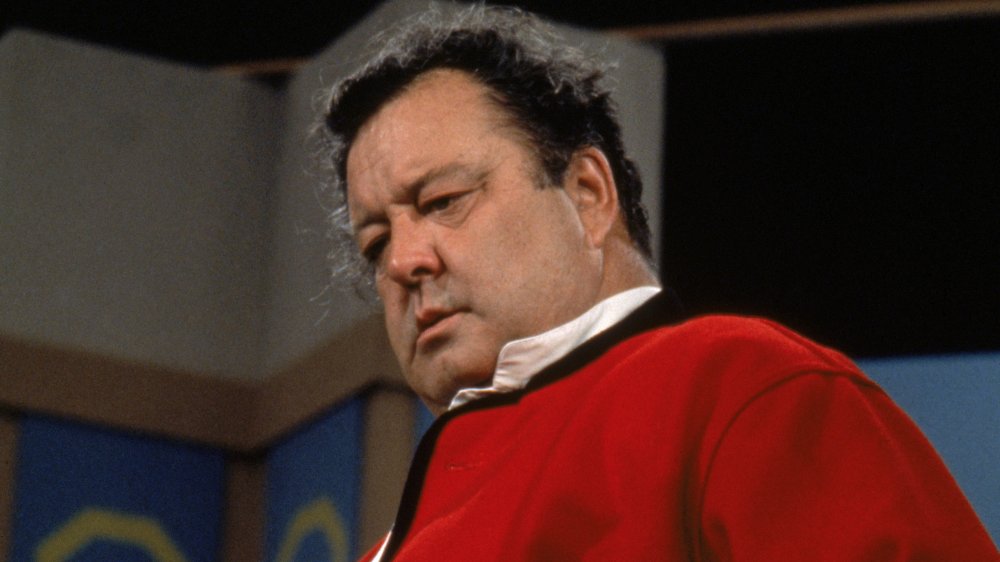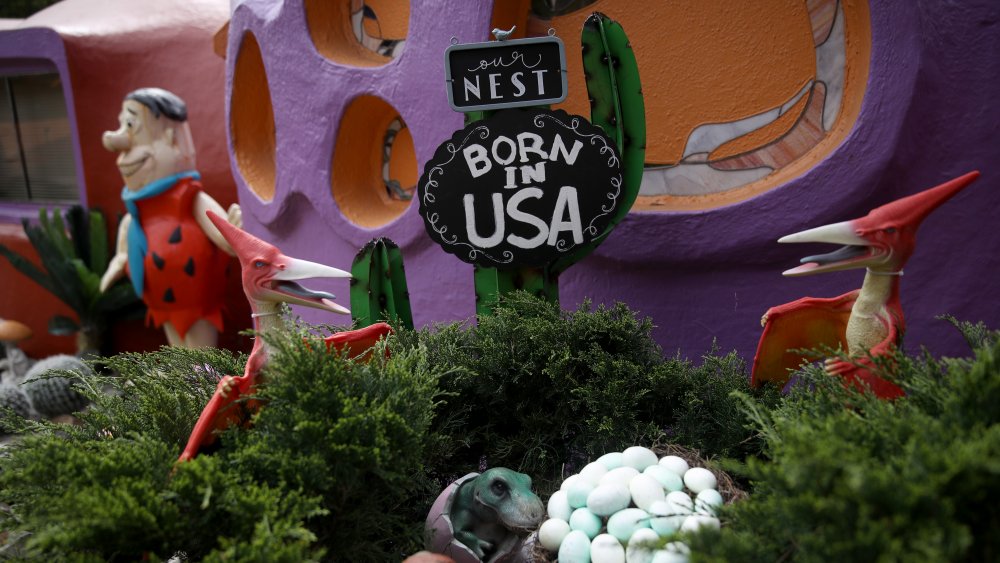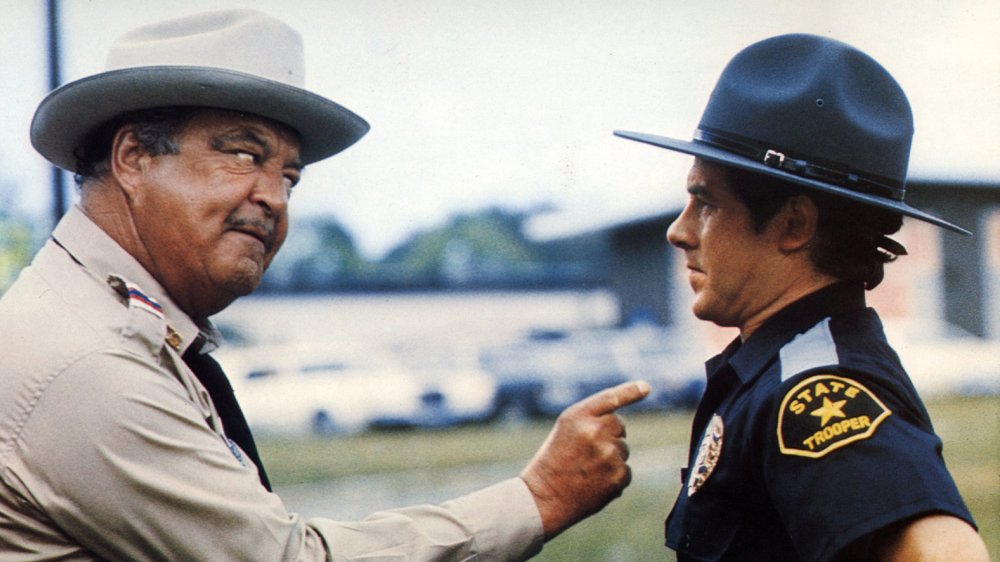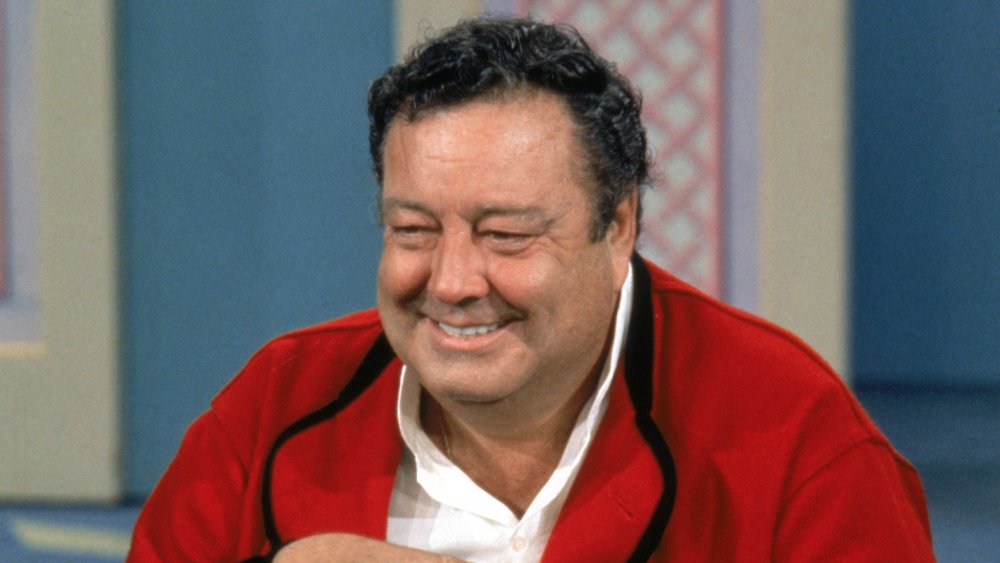Tragic Details About Jackie Gleason
Jackie Gleason is well-remembered as one of the most indomitable stars of the 20th century. Whether on stage or screen, Gleason knew how to capture attention in a club or restaurant — he was truly unforgettable. He was known as someone who loved good food, a glass of whiskey, and the company of beautiful women. His parties and wild nights out were legendary — even the great actor Orson Welles gave Gleason the nickname "The Great One" after a long night of partying and drinking. The name stuck. We remember him best for his variety show The Jackie Gleason Show, which spawned the classic show The Honeymooners. Although The Honeymooners only lasted 39 episodes, the show and its memorable characters are staples in American culture.
But underneath his jocular, smiling public demeanor, Gleason dealt with considerable inner turmoil. His rough beginnings in destitution, his abandonment by his father, and his family's premature deaths irrevocably shaped him. Gleason could be charming and pleasant, but he was also known to be equally nasty, bitter, and bullying — especially toward the people he worked with. These are the tragic details about Jackie Gleason.
Jackie Gleason's father abandoned his family
Jackie Gleason was born on February 26, 1916, to parents Herbert Walter Gleason — an insurance auditor who was born in Brooklyn — and Mae "Maisie" Kelly, who hailed from County Cork in Ireland. Curiously enough, while Gleason was born Herbert John Gleason, he was baptized as John Herbert Gleason. The nickname "Jackie" was given to him by his mother, and it stuck. Gleason grew up in Bushwick, Brooklyn, which was a very impoverished area at the time.
According to Gleason's website, young Jackie knew that he wanted to be an actor from the age of six when his father used to take him to see matinee silent films and vaudeville performances. Unfortunately, the theater visits would be the only good memory that Gleason would have of his father. Herbert Gleason would walk out on his family when Jackie was only nine years old.
He never saw his father again, but according to film historian Dina Di Mambro, that didn't stop Gleason from hoping that he might one day meet his father, even after he became famous: "I would always wonder whether the old man was somewhere out there in the audience, perhaps a few seats away. I guess I always kind of expected him to appear backstage suddenly, saying, 'Hi, I'm your old man.' Then one day, I realized that wherever he was, it would be easy for him to contact me — if he really wanted to."
Jackie Gleason's family died young
Unfortunately, Herbert Gleason's abandonment wasn't the only tragedy that would befall the Gleason family. Jackie Gleason actually had an older brother named Clement, who was a frail and sickly child. This led to the boy dying of spinal meningitis when young Jackie was only three. Once Jackie's father walked out, his mother, Maisie, became even more protective of Jackie — he was all she had left. In Dina Di Mambro's article, Gleason recalled how his desperate mother kept him inside at all times. Between her oldest son's death and her husband's abandonment, Maisie Gleason couldn't bear to lose her last family member.
"I could never go out on the street and play with the other kids. I used to watch them with my face pressed against the window." Gleason recalled. "I think that's how I developed my 'poor soul' look. Hell, I didn't even start school until I was eight years old, two years older than the other kids in my class."
Sadly, Gleason's mother died at the age of 50 — leaving the 19-year-old Gleason alone, homeless, and with only 36 cents in his pocket.
Jackie Gleason got his start In shady nightclubs
The Gleason family had always been poor (their drab apartment in the Brooklyn slums inspired the set of The Honeymooners), but after his mother's death, Jackie was utterly destitute. He needed money, and he needed it soon.
As noted by MeTV, Gleason's then-girlfriend's parents did offer to take him in, but Gleason turned them down. He managed to get a roommate in the city and started taking whatever work he could find. First, he worked some minor gigs as a carnival barker and a daredevil driver, then as an emcee in a Brooklyn club. But what really helped Gleason's career was playing various gigs in some of the seedier nightclubs across New York, New Jersey, and Pennsylvania. According to Entertainment Weekly, Gleason flopped badly in stand-up (and it seemed that he might have stolen his jokes from Milton Berle). Still, he did better as a table-hopping comic, which let him interact directly with an audience.
These entertainment gigs eventually attracted the attention of talent agents who could land him small movie roles and later parts in Broadway musical comedies. By the time he was 34, Gleason had earned his own TV variety show, The Jackie Gleason Show.
Jackie Gleason was a real pool hustler
Before taking the role of legendary pool player "Minnesota Fats" in the classic movie The Hustler, Gleason learned to play pool in real life. As noted by film historian Dina Di Mambro, when Gleason was still a boy, he often tried to pick up odd jobs around his Brooklyn neighborhood to earn extra money to bring home to his mother. As they were living in abject poverty, they needed whatever money they could make between the two of them.
The 12-year-old Jackie managed to find work in a pool hall, where his job was racking up balls for neighborhood toughs who came in to play. While working in the pool hall, Gleason learned to play himself and managed to become quite the pool hustler at a shockingly young age. When it came to filming The Hustler, Gleason didn't need any stunt doubles to do those trick pool shots — they were all Gleason himself. And director Robert Rossen always positioned the camera to show off Gleason's excellent pool skills to the audience.
Jackie Gleason was married three times
Over his lifetime, Jackie Gleason had three wives. The first was a dancer, Genevieve Halford, with whom Gleason had his two daughters, Geraldine and Linda. Although Gleason and Halford were legally married for 34 years, their relationship was extremely fraught. Halford hoped to have a normal, comfortable family life, as noted by The Baltimore Sun, but Gleason was far more interested in going out with friends, drinking, and partying. The two of them separated and reconciled multiple times over.
According to the South Florida Sun-Sentinel, during one of their separations, Gleason also carried on a relationship with another dancer named Marilyn Taylor. He wanted to marry Taylor, but Halford was a devout Catholic and refused a divorce. Marilyn Taylor went on to marry someone else. Halford eventually came around and divorced Gleason in 1970. Only ten days after his divorce from Genevieve Halford, Gleason married a country club secretary named Beverley McKittrick, whom he had met in 1968.
However, in 1973, Gleason learned that the widowed Marilyn Taylor (who had a young son) had moved to Miami. He quickly filed for divorce from McKittrick and married Taylor once the divorce was finalized. Taylor and Gleason remained married for the rest of Gleason's life. Curiously, according to the Associated Press, it has been noted that Gleason changed his will right before he died, significantly reducing Marilyn's bequest and increasing one for his secretary of 29 years.
Jackie Gleason was an alcoholic
Jackie Gleason was an extremely heavy drinker and a hard partier in his day. In fact, according to MeTV, Gleason's parties could get so out of control that one of his hotels had to soundproof his suite to prevent the rest of the guests from being disturbed by Gleason's partying. And when he had been hitting the bottle particularly hard, he wasn't noted as being a fun or affable drunk but has been described as petty, mean-spirited, and nasty. Gleason was also known to drink while he was at work and on set — his drink of choice was coffee and whiskey, as noted by Fame10.
According to The Baltimore Sun, Gleason's biographer William Henry III noted that Gleason seldom spent much time with his family during the holidays. Apparently, he would only spend about half an hour with his wife (Genevieve Halford) and young daughters on Christmas before going out to celebrate the day with his drinking buddies. Gleason's alcoholism and carousing certainly seem to be what really threw a wrench in his first marriage, leading to several separations and reconciliations before the ultimate divorce.
Jackie Gleason was volatile on set
Gleason was a brilliant performer, but he wasn't exactly the easiest person to work with — to put it mildly. According to The Baltimore Sun, Gleason always had high salary demands and outrageous prerequisites (i.e., he had to have the longest limousine). Apparently, Gleason even insisted that CBS move his show to Miami so he could golf year-round.
He wasn't any better when performing, either. Gleason, an outstanding improv, hated rehearsing, feeling that he and his co-stars would give better reactions if they didn't seem so practiced. His Honeymooners cast loathed Gleason's methods — they were forced to rehearse without him. As noted by Fame10, co-star Joyce Randolph admitted that she would "break out into cold sweats" right before filming. This was because Gleason often wouldn't read the script until the day of the show and sometimes wouldn't even give it to his co-stars until hours before they were supposed to go on.
Gleason's drinking was also a huge problem on set. He was known to show up either drunk or openly drinking while working. And the cast and crew could never be sure what his temperament might be. Gleason's drinking caused him to have abrupt mood swings — charming and pleasant one minute and screaming and offensive the next. He might have been a show-biz genius, but Gleason probably didn't make as many memorable shows or movies as he could have just because others in the industry found him so exasperating.
Jackie Gleason was jealous of Art Carney
Jackie Geason and Art Carney — as Ralph Kramden and Ed Norton of The Honeymooners – are among the most iconic duos in 20th-century television. However, despite their off-the-charts chemistry together on screen, the two actors didn't actually get along well in real life — one of the main reasons being the speculation that Gleason felt threatened by Carney's comedic talents and prominent acting career. According to The Morning Call, Gleason, at one point, told actor Orson Welles just how insecure he really was regarding his co-star: "It's like on my show when they laugh at my subordinate Art Carney, that dirty so and so. I smile on the outside, but you should see my insides."
In return, according to Fame10, Art Carney was said to dislike Gleason's lack of professionalism and refusal to take the craft of acting seriously. After The Honeymooners ended in 1956, Carney and Gleason swore they would never work together again. Ultimately, they broke that promise, but the two didn't work together until 1985 for the crime-comedy TV movie Izzy and Moe.
Jackie Gleason exaggerated his musical talent
Besides being a great comedian and actor, Gleason also decided to turn his attention to music. He became a composer later in life and put out almost 40 albums of mood music — in which he is credited as both composer and conductor. He won gold records for two albums, Music for Lovers Only and Music to Make You Misty. According to Britannica, Gleason explained his interest in writing music: "Every time I watched Clark Gable do a love scene in the movies, I'd hear this real pretty music, real romantic, come up behind him and help set the mood. So, I figured if Clark Gable needs that kind of help, then a guy in Canarsie has gotta be dyin' for somethin' like this!"
But Gleason had a secret — he had a lot of uncredited help in making these albums. Per AllMusic, Gleason couldn't actually read or write music — but he could dictate to someone who did. While he had some very basic understanding of music from working with musicians, he wasn't musically trained. So, Gleason hired trumpet player Bobby Hackett to work with him, according to The Baltimore Sun. Hackett apparently did most of the composing, conducting, and arranging, but with minimal credit. Gleason hired Hackett on a union scale pay rate, but Hackett never saw a fraction of the millions that Gleason raked in from his albums.
Jackie Gleason almost killed The Flintstones
The iconic cartoon show The Flintstones was obviously very heavily influenced by The Honeymooners. Nothing was blatantly stolen from The Honeymooners, but the lead characters' mannerisms and personalities were too alike to ignore. Both shows featured a heavyset, loud-mouthed husband with a dim-witted best friend who regularly came up with ludicrous get-rich-quick schemes that were always squashed by their more prudent wives. Both the husband and the best friend characters were also avid bowlers and belonged to a men's club whose members wore ridiculous-looking animal hats.
The Flintstones was so similar to The Honeymooners that Gleason, at one point, considered suing Hanna-Barbera. According to Fame10, his publicist ultimately dissuaded him, pointing out, "Do you want to go down in history as the man who killed Fred Flintstone?" Gleason backed off. Incidentally, The Flintstones would go on to last much longer than The Honeymooners. While The Honeymooners ended after 39 episodes (because Gleason feared becoming too repetitive, not due to a lack of popularity), The Flintstones had multiple seasons and spawned several spin-offs, TV specials, and movies.
Jackie Gleason had to make one last film
By the mid-'80s, Jackie Gleason's health was on the decline, and he thought he was done making movies. But director Garry Marshall had other ideas. According to MeTV, Marshall was dead set on Gleason starring in his latest film, Nothing in Common. Gleason was to star alongside Tom Hanks, playing Hanks' bad-tempered, self-absorbed, curmudgeonly father. Gleason was reluctant to take on the role, fearing the strain that doing another movie might put on his health. But then Marshall reminded Gleason that his last theatrical film credit was Smokey and The Bandit III in 1983 (pictured above) — a film widely regarded as awful and with highly negative reviews. (Today, it has a score of only 17 percent on Rotten Tomatoes).
Marshall needled Gleason, suggesting that maybe he might want to reconsider letting that be the last movie on his record. That was enough for Gleason. He might have been in poor health, but he would be damned if Smokey and The Bandit III would be known as the last film he ever made before he died. Nothing In Common was officially Gleason's final film. It received mixed reviews overall, but Gleason's performance was met with praise from critics. The movie has a 57 percent rating on Rotten Tomatoes – certainly an improvement over Smokey and The Bandit III.
Jackie Gleason died too early
Jackie Gleason died on June 24, 1987, at the premature age of 71. Gleason had been suffering from multiple health issues for years but endeavored to keep that fact a secret from the public. Nevertheless, his years of hard partying, voracious alcohol consumption, and extravagant eating inevitably caught up with him. Although Gleason had always been overweight, his lifestyle choices led to phlebitis (vein inflammation), diabetes, and hemorrhoids. However, the ultimate cause of Gleason's death was colon cancer. Although he tried to keep his condition private, it became obvious to many that Gleason was seriously ill as time went on. Even Gleason himself couldn't ignore the fact that the end was probably coming soon. A year before his death, he privately admitted to one of his daughters, "I won't be around much longer."
According to Fabiosa, in an interview with Gleason's stepson, Craig Horwich (Marilyn Taylor's son from her first marriage), Horwich fondly recalled his stepfather — who had been in his life since the age of 12: "He wanted to be at the head of the table with as many people and all the wonderful food and fun that came with it. But then he also had a great pleasure of reading and listening to music and solitude." Gleason will be remembered as a complicated, often problematic, and volatile person, but his legacy as a brilliant performer with legendary achievements will live on.
